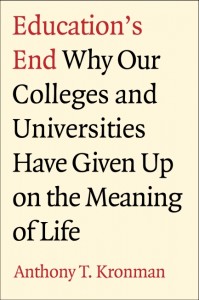Last fall Anthony Kronman, Sterling Professor of Law at Yale, kicked off the academic year with a Boston Globe op-ed entitled Why are we here? Colleges ignore life’s biggest questions, and we all pay the price. In response, Comment hosted an excellent on-line mini-symposium with several scholars including Steven Garber (Director, Washington Institute for Faith, Vocation and Culture), Dr. James K. A. Smith (Associate Professor of Philosophy, Calvin College), and Greg Veltman (Ph.D. Student, University of Pittsburgh). As you enter the new term and consider the role of higher education, take some time to read and briefly respond to these short pieces and Kronman’s response. …
To whet your appetite, below’s part of Dr. James K. A. Smith‘s response to Why are we here? Colleges ignore life’s biggest questions, and we all pay the price:
While I think his diagnosis of the commodification of knowledge in University, Inc. is right on the money; and while I’m all for a more robust role for the humanities in a university education; and while I’m downright enthusiastic about a university education that actually grapples with “the big questions” about what it means to be human and what it looks like to live “the good life” —the fact is Kronman’s lament points out the need for so much more than he proposes. What’s needed is for the university to recover an understanding of education as formation.
But Kronman’s liberalism won’t let him imagine that. In order for education to be formative —in order for education to actually mold and shape students into certain kinds of people who are primed to live out a vision of the good life —such education needs to be shaped by a story, grounded by a tradition, and oriented toward a particular vision of the Good. But that would entail a violation of cherished liberal principles of the modern university —the stories it tells itself about its alleged neutrality, its supposed tolerant largesse, and its respect for human autonomy and self-determination. This is why he demonizes a “religious” education as the worst possible threat. So Kronman really just imagines a liberal, modern bastardization of a formative education: a syllabus that “raises the big questions,” but then leaves the sophomore in the place of lord and master, free to make her own decisions about the good life. (In this respect, his pedagogical memory is selective: the rich tradition of education that he points toward was not just unabashedly formative. It was, at times, positively dogmatic!) — Dr. James K.A. Smith, Associate Professor of Philosophy, Calvin College.

Note: Anthony Kronman‘s Education’s End: Why Our Colleges and Universities Have Given Up on the Meaning of Life was released last September by Yale University Press. For Micheal Hickerson‘s exploration of Education’s End, follow the Education’s End tag.
Tom enjoys daily conversations regarding living out the Biblical Story with his wife Theresa and their four girls, around the block, at Elizabethtown Brethren in Christ Church (where he teaches adult electives and co-leads a small group), among healthcare professionals as the Northeast Regional Director for the Christian Medical & Dental Associations (CMDA), and in higher ed as a volunteer with the Emerging Scholars Network (ESN). For a number of years, the Christian Medical Society / CMDA at Penn State College of Medicine was the hub of his ministry with CMDA. Note: Tom served with InterVarsity Christian Fellowship / USA for 20+ years, including 6+ years as the Associate Director of ESN. He has written for the ESN blog from its launch in August 2008. He has studied Biology (B.S.), Higher Education (M.A.), Spiritual Direction (Certificate), Spiritual Formation (M.A.R.), Ministry to Emerging Generations (D.Min.). To God be the glory!

Leave a Reply